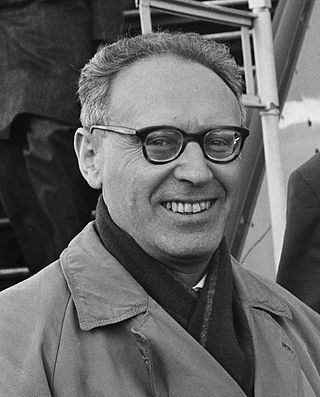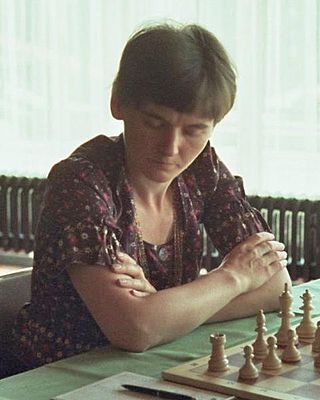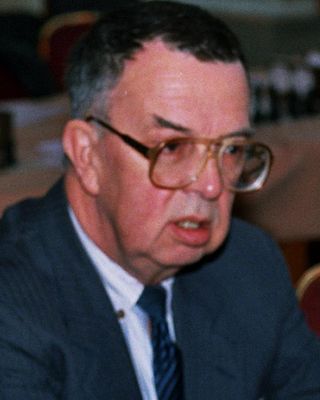
Anatoly Yevgenyevich Karpov is a Russian and former Soviet chess grandmaster, former World Chess Champion, and politician. He was the 12th World Chess Champion from 1975 to 1985, a three-time FIDE World Champion, twice World Chess champion as a member of the USSR team, and a six-time winner of Chess Olympiads as a member of the USSR team. The International Association of Chess Press awarded him nine Chess Oscars.

The International Chess Federation or World Chess Federation, commonly referred to by its French acronym FIDE, is an international organization based in Switzerland that connects the various national chess federations and acts as the governing body of international chess competition. FIDE was founded in Paris, France, on July 20, 1924. Its motto is Gens una sumus, Latin for 'We are one Family'. In 1999, FIDE was recognized by the International Olympic Committee (IOC). As of December 21, 2023, there are 201 member federations of FIDE.
Grandmaster (GM) is a title awarded to chess players by the world chess organization FIDE. Apart from World Champion, Grandmaster is the highest title a chess player can attain. Once achieved, the title is held for life, though exceptionally the title can be revoked for cheating.

Tigran Vardani Petrosian was a Soviet-Armenian chess grandmaster and the ninth World Chess Champion from 1963 to 1969. He was nicknamed "Iron Tigran" due to his almost-impenetrable defensive playing style, which emphasized safety above all else. Petrosian is often credited with popularizing chess in Armenia.

The World Chess Championship is played to determine the world champion in chess. The current world champion is Gukesh Dommaraju, who defeated the previous champion Ding Liren in the 2024 World Chess Championship.

Mikhail Nekhemyevich Tal was a Soviet and Latvian chess player and the eighth World Chess Champion. He is considered a creative genius and is widely regarded as one of the most influential players in chess history. Tal played in an attacking and daring combinatorial style. His play was known above all for improvisation and unpredictability. Vladislav Zubok said of him, "Every game for him was as inimitable and invaluable as a poem".

David Ionovich Bronstein was a Soviet chess player. Awarded the title of International Grandmaster by FIDE in 1950, he narrowly missed becoming World Chess Champion in 1951. Bronstein was one of the world's strongest players from the mid-1940s into the mid-1970s, and was described by his peers as a creative genius and master of tactics. He was also a renowned chess writer; his book Zurich International Chess Tournament 1953 is widely considered one of the greatest chess books ever written.

Mikhail Moiseyevich Botvinnik was a Soviet and Russian chess grandmaster who held five world titles in three different reigns. The sixth World Chess Champion, he also worked as an electrical engineer and computer scientist and was a pioneer in computer chess. He also had a mathematics degree (honorary).

Vasily Vasilyevich Smyslov was a Soviet and Russian chess grandmaster who was the seventh World Chess Champion from 1957 to 1958. He was a Candidate for the World Chess Championship on eight occasions. Smyslov twice tied for first place at the USSR Chess Championships, and his total of 17 Chess Olympiad medals won is an all-time record. In five European Team Championships, Smyslov won ten gold medals.

The World Junior Chess Championship is an under-20 chess tournament organized by the World Chess Federation (FIDE).
This is a timeline of chess.

Isaac Yefremovich Boleslavsky was a Soviet chess player and writer.

Viacheslav Vasilyevich Ragozin was a Soviet chess player, writer and editor. He was world champion in correspondence chess and held the title of Grandmaster in both over-the-board and correspondence chess.
The European Team Championship is an international team chess event, eligible for the participation of European nations whose chess federations are located in zones 1.1 to 1.9. This more or less accords with the wider definition of Europe used in other events such as the Eurovision Song Contest and includes Israel, Russia and the former Soviet States. The competition is run under the auspices of the European Chess Union (ECU).

Lidia Kostjantynivna Semenova is a Ukrainian chess player, who holds the title of woman grandmaster.
Lev Solomonovich Aronin was a Soviet International Master of chess. He was a meteorologist by profession.
Anatoly Alexandrovich Bannik was a Ukrainian chess Master. He was a five-time Ukrainian champion, and qualified for the Soviet Chess Championship final seven times. He was among the top half-dozen Ukrainian players from 1944 to 1966. Bannik spent the last years of his life in Germany, and was active in competitive chess as recently as 2000.

Nikolai Vladimirovich Krogius was a Russian chess Grandmaster, International Arbiter (1985), psychologist, chess coach, chess administrator, and author. He won several tournament titles at Sochi and in Eastern European events, and appeared in seven Soviet finals from 1958–71. His peak was in 1967 when he ranked 18th in the world for a time. He earned his doctorate in psychology, and specialized in sports psychology. He coached World Champion Boris Spassky for several years, also served as chairman of the USSR Chess Federation, and co-authored five chess books. He was the co-winner of the 1993 World Senior Chess Championship.

Viktor Lvovich Korchnoi was a Soviet and Swiss chess grandmaster (GM) and chess writer. He is considered one of the strongest players never to have become World Chess Champion.
Zara Nakhimovskaya (Kavnatsky) (Latvian: Zāra Nahimovska or Zāra Kavnacka; born 6 June 1934) is a Latvian chess player. She won the Latvian Chess Championship for women in 1958, 1959, 1961, and 1962.














